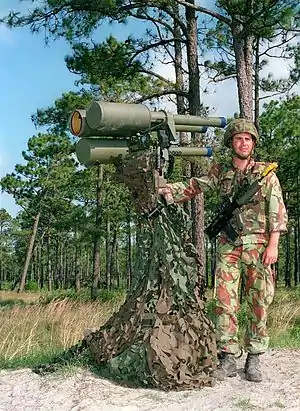Javelin (surface-to-air missile)
Javelin is a British man-portable surface-to-air missile, formerly used by the British Army and Canadian Army. It can be fired from the shoulder, or from a dedicated launcher known as Javelin LML: Lightweight Multiple Launcher. Capable of being vehicle mounted, the LML carries three rounds.
| Javelin | |
|---|---|
 British soldier posing with Javelin triple launcher(1996) | |
| Type | Manportable surface-to-air missile |
| Place of origin | United Kingdom |
| Service history | |
| Used by | See Operators |
| Production history | |
| Manufacturer | Thales Air Defence |
| Specifications | |
| Mass | 11.1 kilograms (24 lb) (Missile) 24.3 kilograms (54 lb) (System) |
| Length | 1.39 metres (4 ft 7 in) |
| Width | Pens |
| Diameter | 76 millimetres (3 in) |
| Crew | 1 |
| Effective firing range | 300 to 4,500 metres (980 to 14,760 ft) against jets to 5,500 metres (18,000 ft) against helicopters |
| Warhead | High Explosive warhead |
| Warhead weight | 2.74 kilograms (6.0 lb) (containing 0.6 kilograms (1.3 lb) of HE) with contact and proximity fuzes |
Detonation mechanism | Impact force or Proximity Fuze |
| Engine | Solid Fuel Rocket |
| Maximum speed | Mach 1.7+ approx. |
Guidance system | SACLOS system |
It was replaced in front line British service by the Javelin S-15, sold commercially as the Starburst surface-to-air missile in 1993 (radio frequency guided Javelin was retained for some time thereafter for training purposes), and later by the Starstreak starting around 1997. The Javelin GL was hastily purchased by the Canadian Forces to replace the existing Blowpipe surface-to-air missile system that failed last-minute tests during preparations for the deployment to the Gulf. It was later replaced by the Javelin S15 until retired without replacement in 2005.
History
The missile was developed as a replacement for the Blowpipe MANPADS, which had proven largely ineffective in the Falklands War although it was used by both sides. Only two hits were recorded out of more than 100 launches: a British Harrier GR3 (XZ972) attacked by Argentine Army special forces (Commandos Company), and an Argentine Aermacchi MB-339 (0766 (4-A-114)) during the Battle of Goose Green.[1]
Operational use
Similar in overall appearance to the Manual Command Line of Sight (MCLOS), radio frequency guided Blowpipe, Javelin is slightly more compact, uses Semiautomatic Command Line of Sight (SACLOS) radio frequency guidance and is fitted with an improved warhead. The operator is equipped with a 6× magnification sight and a long range T.V. camera to locate targets. Although the Javelin's accuracy is somewhat susceptible to smoke, fog, or clouds, it is claimed to be virtually impossible to decoy it away from a target with flares.
Operators
_operators.png.webp)
Current operators
- In 1991 the Botswana Defence Force procured 25 missiles with five launchers[2]
References
- Freedman, Sir Lawrence, The Official History of the Falklands Campaign (Abingdon, 2005). Volume II, pp. 732–735
- MOTLOGELWA, TSHIRELETSO. "Khamas monopolised Botswana Defence Force (BDF) tenders". X air Forces.
- Jane's Land-Based Air Defence 2005–2006, ISBN 0-7106-2697-5
- "Javelin".
- "Javelin Surface-to-Air Missile".